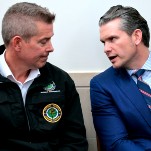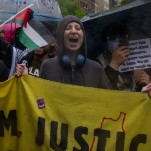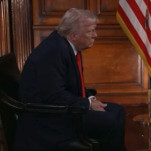The Evolution of Nate Parker’s Awful Birth of a Nation Press Tour
LatestNate Parker has made a series of demonstrably foolish public statements in the months leading up to the release of The Birth of A Nation, a film that postures itself as a revolutionary story about Nat Turner’s Virginia slave revolt. As Parker trudges his way through a promo trail for a film that many agree is largely a disappointment, he’s offered one bad answer after another, with minimal tact, while fielding questions about his 1999 rape trial as a student at Penn State.
On Thursday night, the WGA held a screening of The Birth of A Nation in Manhattan, with a Q&A afterward that was much like the ones before it—Parker indulged a standing ovation from most of the audience and then answered questions. The panel, which included Parker and part of his cast (Aja Naomi King, Penelope Ann Miller and Colman Domingo), stepped over the elephant and focused on explaining what it took to fulfill Parker’s vision of a slavery film that ultimately opts for unchallenging pomp over sophisticated storytelling. Parker told the audience he wanted to “steer away from the obvious tropes that are always associated with films like this” and to show “what it was like for well-intentioned slave owners,” which is preposterous.
This went relatively smoothly when compared to Parker’s earlier appearances. A few days after his first major interview in early August with Deadline—the one where he aimed to get ahead of the rape trial he expected to resurface—Variety reported that the woman who accused him of rape had committed suicide in 2012; her brother cited post-trial depression as a factor. As star, co-writer and director of The Birth of a Nation, Parker had tried to preempt the press coverage of the old allegations by speaking on it from the jump. This botched attempt at honesty proved to be a foolish strategy, in part because it ignored the fact that any “strategy” would’ve failed given the circumstances of the trial, and all the PR training in the world can’t correct flaws in ego.
In piece published Friday, The Hollywood Reporter revealed that, according to sources, Oprah Winfrey “suggested Parker address the matter in an appearance with [Gayle] King on her CBS program. But Parker declined. He was angry that what he saw as a consensual, youthful sexual experimentation gone awry had become an issue years later despite his acquittal, and that it was happening just when his Nat Turner passion project was not only finished but positioned as a major Oscar contender.”
It helps little that The Birth of a Nation stands as an unimpressive piece of art. In “The Birth of a Nation Isn’t Worth Defending,” The New Yorker’s Vinson Cunningham, citing great filmmakers like Ava DuVernay and Ryan Coogler, concluded: “We do them and ourselves a disservice by lowering our expectations, and extending undue credit to bad art.” Over the past few months, when faced with tough questions about the rape trial during his press run, Parker has detached himself, denied any wrongdoing and refused to apologize, all of which has made it impossible to take him seriously.
Deadline Panel, Sundance Film Festival
Held: January 26, 2016
Parker said: “There is a system, that is based on race, that says African American films don’t sell, so this is a win for independent filmmakers, this is a blow against white supremacy and racism in this country and abroad. We don’t have to accept those rules, those ideas that started before we were doing it. Who made up the rules? No one knows. Yet we abide by them? No, no more. I’m swinging a hammer, I wanna break everything. Subvert, subvert, subvert.”
It’s easy to see how critics here were lured by the intensity of Parker’s self-important speech. He’d seemingly presented them with art that could counter the flurry of whiteness in Hollywood. But as Soraya Nadia McDonald wrote at The Undefeated:
An atmosphere of scarcity teaches us to grab serious, ambitious films such as The Birth of a Nation and treat them as manna in a cultural food desert. Scarcity unfairly becomes part of the context of how we evaluate film. It blinds us, or at least allows us to paper over issues that otherwise might raise red flags.
American Black Film Festival Panel
Held: June 17, 2016
-

-

-

-

-

-

-

-

-

-

-

-

-

-

-

-

-

-

-

-

-

-

-

-

-

-

-

-

-

-

-

-

-

-

-

-

-

-

-

-







































